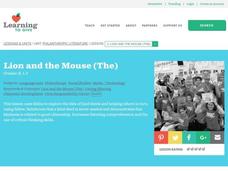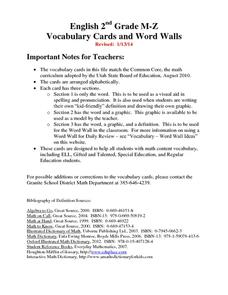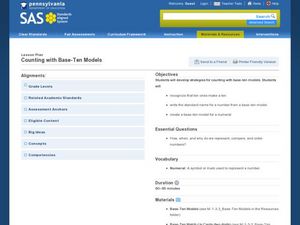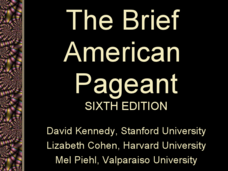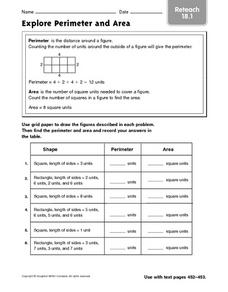Curated OER
Where Do I Live?
Students study the characteristics of communities. Students identify similarities and differences in communities. Students identify that all people have basic needs, understanding that these needs are met through the community. Students...
Curated OER
Whose River Is It?
Students explore the world around them through authors, poets, and artists eyes and ears as it relates to them with the river theme. They examine and interpret conditions that might affect the river. Students read books about rivers....
Curated OER
Children's Literature Across the Curriculum Ideas-Ira Sleeps Over
Students read Ira Sleeps Over by Bernard Waber. They complete a variety of cross-curricular activities surrounding the ideas presented in the story. Included are reading, art, math, science, writing, social studies, and library...
Curated OER
Caravel: Research Skills
In this research skills worksheet, students research the 11 listed ship parts of a 15th century caravel. Students then draw and label a caravel.
Curated OER
Fable for Tomorrow and Today -- Rachel Carson's Silent Spring
Students read Rachel Carson's "Silent Spring". They identify their beliefs about the environment while reading the story. They discuss and write about those beliefs and realize how one person can have an impact on the world.
Curated OER
The Lion and the Mouse
Students examine a story. For this good citizenship lesson, students read the story "The Lion and the Mouse" and discuss being kind and what it means to be a good citizen. Students hold a discussion about how other animal pairs could...
Curated OER
Digging Up The Facts
Students research environmental issues. In this environmental lesson, students use the Internet to research an environmental problem and list ten facts about it. Students write a summary of facts.
Houghton Mifflin Harcourt
Use a Graph: Measure Fish
Something's fishy here! Use the bar graph provided to determine the length of each fish shown. Small cartoon fish make this an engaging worksheet for young learners. There are six questions provided.
Curated OER
Integers and Absolute Value - Homework 22.1
Young math whizzes write the opposite of the each integer in the first twelve problems. They write the absolute value for each integer in the second set of problems and name a pair of integers with the same absolute value.
Houghton Mifflin Harcourt
Answering Sheet 1-50
Much like a Scantron form, use this printable for your next multiple choice assessment. The form is designed for a 50-question assessment, with each question having four possible answer choices: A-D or F-J.
Houghton Mifflin Harcourt
Four-Quadrant Grid
Give your graphers a complete grid to neatly organize their coordinates and lines without having to draw one on their own. This four-quadrant grid provides labeled markers for each line up to -10 and +10 in all directions.
Curated OER
Centimeters and Meters - Reteach 17.5
In this metric measurement of length worksheet, learners find the 4 real objects pictured and estimate the length in centimeters. Students then measure and record the lengths in centimeters or meters.
Curated OER
Convert Metric Units of Capacity and Mass
Use this converting metric units worksheet to have your learners solve six word problems where they covert metric units of mass and capacity in order to arrive at an answer.
Curated OER
Vocabulary Cards 2nd Grade M-Z
Math vocabulary has never been easier to understand! Use vocabulary cards to bring word walls to your classroom, helping kids make the connection between important math terms and easy-to-understand illustrations.
ProCon
Tablets vs. Textbooks
Learners decide if tablets should replace textbooks in K-12 schools. They watch four pro and con videos and discover the history of the tablets-versus-textbooks debate. As a bonus, the resource allows them to submit their own comments...
Curated OER
Counting with Base - Ten Models
Help your kids develop strategies for counting. In this base-ten lesson, learners use matching cards, base 10 blocks, and dry erase markers and boards to examine the base 10 counting system.
Curated OER
Prime Factorization: Finding Factors in the Fifth Grade
The lesson plan starts out with a brain drain, which is a great way to get students to activate prior knowledge and build lasting connections. They tell everything they know about prime factorization, use their knowledge to...
Curated OER
The Brief American Pageant: American in World War II
From the home front to the middle of Europe, America's presence in World War II was forever transitioning with the strain of war. The variety of maps and charts offered in this presentation helps to contextualize the 1940's. The amount...
Curated OER
America Moves to the City (1865-1900)
Statistical data can show shifts in human populations without bias or a prescribed historical point of view. View bar graphs and charts that describe new influxes in urbanization, immigration, and suffrage by state during the turn of the...
Curated OER
Guided Reading: Three Little Pigs (Plus Wolf: Javalinas)
Guide your class through reading various versions of The Three Little Pigs. Talk about the traditional story line and then discuss a different point of view: Maybe the wolf was just an innocent bystander! This lesson plan, which has...
Curated OER
Explore Perimeter and Area - Reteach 18.1
In this perimeter and area worksheet, learners review the steps to find perimeter and area. Students then use grid paper to draw the figures described in 6 questions. Learners note the perimeter and area of shapes as well.
Curated OER
Explore Perimeter and Area - Homework 18.1
In this geometry worksheet, students complete a homework assignment in which they draw rectangles that have the same area but different perimeters and vise versa. They draw a rectangle with a given area and perimeter.
Curated OER
Lengths of Horizontal and Vertical Line Segments
Use this lengths of horizontal and vertical line segments practice worksheet to have learners sharpen their problem solving skills as they solve six story problems.
Curated OER
Read a Map
In this word problem worksheet, 5th graders use a coordinate grid as a map to answer 6 problems. They work with ordered pairs, locate quadrants, and apply the information to find items in the zoo.





